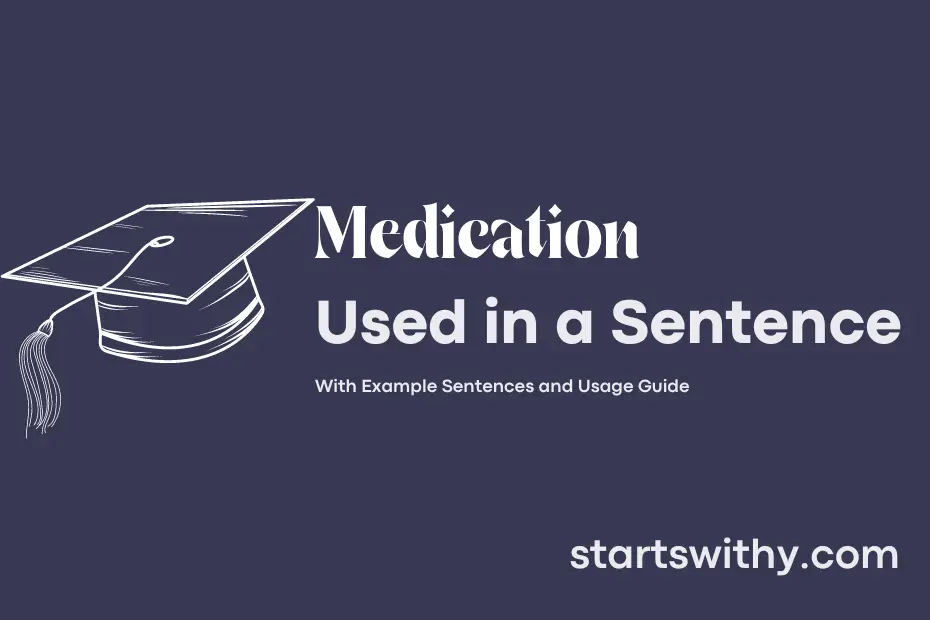Medication plays a crucial role in treating various medical conditions by providing relief, managing symptoms, and improving overall health. In simple terms, medication refers to any substance or drug that is used to diagnose, treat, or prevent illness or disease.
Prescribed by healthcare professionals, medication can come in different forms such as pills, injections, creams, or liquids. It is important to follow the recommended dosage and instructions for taking medication to ensure its effectiveness and minimize potential side effects.
7 Examples Of Medication Used In a Sentence For Kids
- Medication helps us feel better when we are sick.
- Doctors give us medication to help us get well.
- It is important to take the right amount of medication.
- Medication can come in different forms like syrup or tablets.
- Always ask an adult before taking any medication.
- Never share your medication with others.
- If you feel unwell, tell an adult so they can give you the right medication.
14 Sentences with Medication Examples
- Medication can be purchased at the college health center for common illnesses.
- It’s important to consult a doctor before taking any medication for a chronic condition.
- Make sure to keep your medication organized in a pill organizer to avoid missing any doses.
- Trying to balance studying and a part-time job can sometimes lead to forgetting to take your medication.
- It’s crucial to follow the prescribed dosage instructions when taking any medication.
- The college pharmacy offers a discounted price on medication for students with a valid ID.
- Always check with your professor if you need to bring medication to the exam hall.
- It’s a good idea to have a small first aid kit with basic medication in your college bag.
- Never share your medication with others, as it may not be safe or effective for them.
- Remember to inform your college counselor if you need any special accommodations related to your medication.
- Some students find it helpful to set a daily alarm on their phone as a reminder to take their medication.
- Don’t hesitate to seek help from the college nurse if you are feeling unwell or need advice on medication.
- It’s common for college students to experience stress, which can impact the effectiveness of their medication.
- Some colleges offer counseling services to help students manage mental health conditions alongside their medication.
How To Use Medication in Sentences?
To use medication in a sentence, you should first identify the medication you are referring to. This could be a prescription drug, over-the-counter medication, or any other type of remedy.
Next, clearly state the purpose for which the medication is used. For example, “I take ibuprofen to relieve my headache.”
It’s important to mention the dosage or amount of the medication being used. You can say, “The doctor prescribed me to take two tablets of the medication daily.”
Make sure to include any specific instructions or precautions that need to be followed when using the medication. For instance, “Shake the bottle well before each use.”
Describe the frequency at which the medication should be used. You could say, “Take the medication every 6 hours as needed for pain.”
Finally, provide context or a scenario to illustrate how the medication is used in a sentence. For example, “She uses allergy medication to control her symptoms during the spring season.”
Remember to always follow your healthcare provider’s instructions when using medication and never exceed the recommended dosage.
Conclusion
In conclusion, the importance of following a prescribed medication regimen cannot be overstated. Skipping doses or not taking medication as directed can lead to ineffective treatment outcomes or even harmful side effects. It is crucial to adhere to the prescribed schedule and dosage to ensure the medication works as intended and provides the desired therapeutic effects.
Remember, medication is designed to improve your health and well-being. Always consult with your healthcare provider if you have any concerns or experience adverse reactions. By following your medication instructions diligently, you can better manage your condition and work towards achieving optimal health outcomes.



